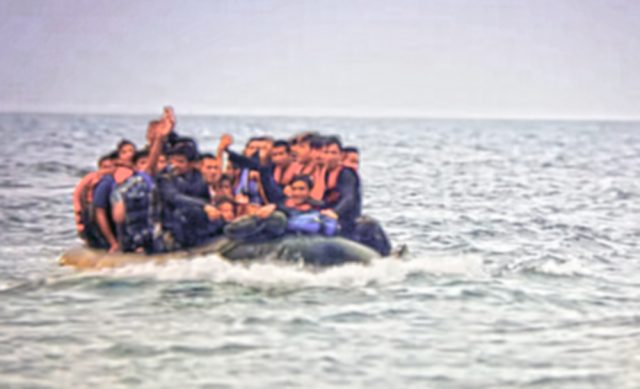
A total of 31,200 migrants entered Europe irregularly in the first two months of the year. Revealing the numbers, which are in line with data for January and February 2023, is Frontex, the European Border and Coast Guard Agency. Compared to a year ago, however, there has been a sharp decline in illegal entries in the central Mediterranean Sea and from the Balkans, while making triple-digit percentage increases in the eastern Mediterranean and West African routes.
While 4,300 refugees landed on Italian shores, with a 70 percent reduction on an annual basis, 9,150 (+117 percent) and 12,100 (+541 percent) individuals landed in Greece and in the Canary Islands, respectively. The figure from the Spanish archipelago, located off the Moroccan coast, is the highest ever noted by Frontex. Criminal organizations operating in Mauritania allegedly intercepted the increased number of sub-Saharan migrants in the country and offered them an entry route to Europe. Aboard cayucos, small, rudimentary fishing boats, hundreds of people brave the pitfalls of the Ocean to seek refuge and a new life in the Spanish outpost in the middle of the Atlantic. With fewer controls than in the Mediterranean, the West African route is becoming the most travelled, as well as the most dangerous.
Italy a key player in international cooperation
Europe cannot remain indifferent to migratory flows and the emergencies that states like Italy, Spain or Greece may find themselves facing again. Stances and solutions are needed.
Brussels is struggling to get into gear, especially with only a few months to go before elections in June, when the citizens of the Old Continent will be called to the polls to elect new parliamentarians. And so it is that leading the way and urging the Union of 27 to a change of pace are states that have every interest in stemming the illegal flows. Italy, in this sense, is playing a central and leading role in international cooperation.
Giorgia Meloni’s government has put the issue among the country’s priorities and wants Europe to do the same. If landings have decreased both in the last months of 2023 and in January and February of 2024, one reason is to be found as much in the political actions endorsed by Rome as in the Italian government’s willingness to build bridges and equal forms of cooperation with African states. The Mattei Plan, with its 5.5 billion in credits, as well as operations and guarantees to produce social development, is one example.
The historic EU-Egypt agreement
Italy’s authority also emerged in the historic agreement between the European Union and Egypt last 17th of March. In Cairo, in fact, Giorgia Meloni and Ursula Von Der Leyen, accompanied by the prime ministers of Belgium, Austria, Greece and Cyprus, met with the Egyptian president, Abdel Fattah Al Sisi. The groundwork was laid on the table for a European Union-Egypt strategic partnership that will last until 2027.
Europe recognizes the government in Cairo as having a vital strategic role in all those geopolitical issues affecting the Mediterranean, Africa and the Middle East. That is why, as the United Arab Emirates, the International Monetary Fund and the World Bank have already done, it wants to help Al Sisi’s country grappling with a troubling economic crisis. On the one hand, there is the devaluation of the Egyptian pound, which is weakening the economy, and on the other hand, continued attacks by the Houthis on ships crossing the Suez Canal could cause further problems and losses for the Egyptian government.
On the plate, the European Union has put 7.4 billion in aid and 600 million in grants, including 200 million for the irregular flow emergency. This is a common challenge that Egypt, Italy and Europe want to address and overcome by strengthening legal migration routes and pathways, and intensifying efforts to stop the hordes of criminals and irregular migrants. In this regard, the signatories spoke of a holistic approach to migration.
A model that sets the standard
The operation carried out in Cairo and sponsored by the Meloni government is reminiscent of the one in Carthage. Last July, the European delegation, headed by Commission President Ursula von Der Leyen, Italian Prime Minister Giorgia Meloni and Mark Rutte, Prime Minister of the Netherlands, signed a memorandum of understanding with Tunisian President Kais Saied. After a great deal of diplomatic work, in which Italy was an absolute protagonist, Europe proposed a 255 million aid package, including as much as 105 million to stem migratory flows.
That partnership, as Prime Minister Giorgia Meloni had recalled, “represents for us a model for building new relations with our neighbours in North Africa.” Eight months after that agreement, Italy has followed up on its project and intentions. Indeed, as the premier reiterated in Cairo, the proposed model for dealing with irregular migration flows has set the standard.



 Subscribe
Subscribe